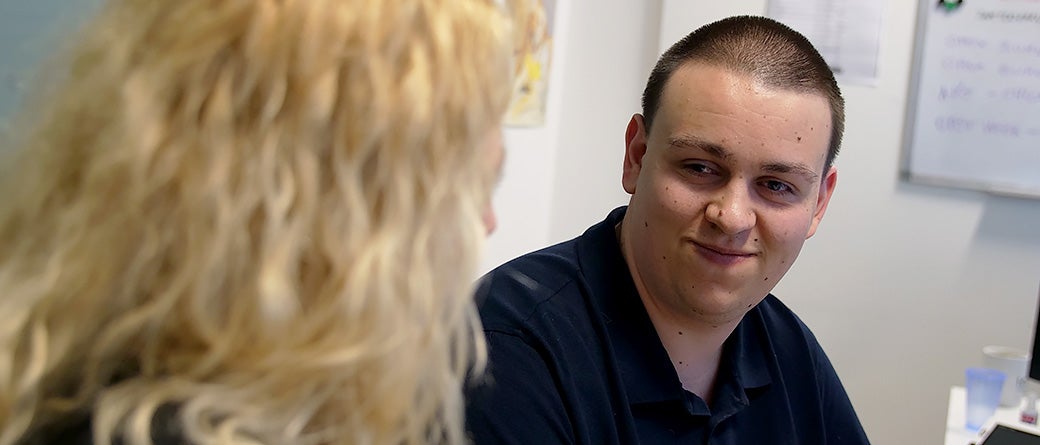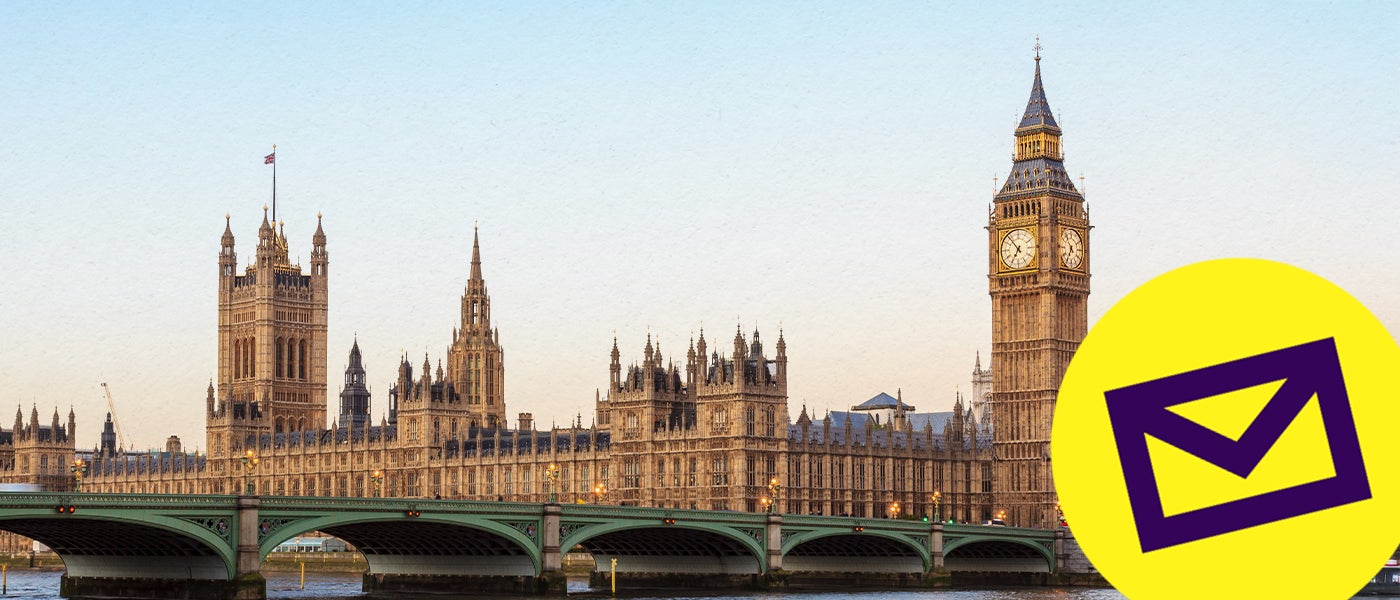- Home
- News and stories
- Finding employment as a disabled young man
Finding employment as a disabled young man
 19 June 2019
19 June 2019
My name’s Charles, I'm 24, severely sight-impaired and registered blind. I still have about ten percent of my vision.
I’ve had sight loss since birth. It’s hereditary. My dad is also visually impaired, so I've been brought up for it to be natural and not feel that I have a disability.
I'd describe myself as disabled, because I do see the barriers all the time with what I can and I can't do compared to a non-disabled person. But when it comes to it, I don't play on the fact I'm blind. I just am blind.
Mainstream education didn’t support me
I was in mainstream education up to about Year 5. The primary school didn't believe it was important to teach me how to read and write, because, I'd “never be able to see, so there's no point?” Which obviously stunted my development quite a lot.
My dad thought I should be getting some form of proper education, so he pulled me out of the school and we moved to Coventry. There, I went to a specialist pan-disability school, where I went from strength to strength, and learned how to read and write.
I became quite confident with being visually impaired. There were other people there like me, and I wasn't made to feel I was someone different.
I didn't finish school amazingly. I’d only left with two GCSEs above C, one of which was in Expressive Arts. I wanted to be an actor at the time and thought ‘I'm going to go off and do Performing Arts at college, not a problem!'
So I decided to up sticks and move to a residential college for visually impaired and blind people, almost 70 miles away from my home and parents. It wasn’t an easy thing to do at sixteen. It was quite a big decision, but I knew it was going to be something I'd benefit from. I guess I just did it.
I did two BTEC Level 3 diplomas at college in Performing Arts and IT. Whilst I was in my first year, I retook GCSE Maths and English, and through very little teaching, I passed at grade C quite easily. So, it showed me I was capable of more.
Finding the right job role
Getting two diplomas behind me was really good, and that's where I started my IT interest. I'd trained to be an IT technician and my aspirations to be an actor turned into more of a hobby.
I was a bit of a techie anyway. I think being visually impaired or blind, you're naturally a bit of a techie, because you want to find ways around doing things easily, and technology is so helpful with that.
I was struggling after finishing college though. It was very difficult to find techie work as someone who couldn't see very well. I think the Health and Safety people were going, 'No, no, no!'
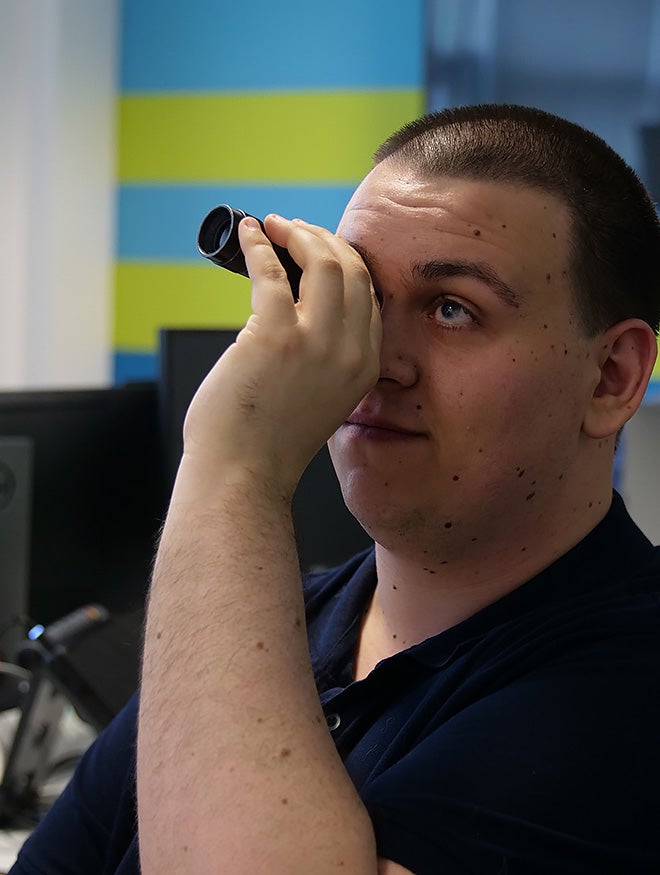
Going to university
After a year gap between college and uni, because I just couldn't find work, I found a course offering a degree in digital marketing and social media, after a friend encouraged me.
University was such a big learning-curve in itself, because it was such a big step going from special education to mainstream education, and being the only person in the room with a disability.
I did struggle quite a bit in my first year at University. It was very unfortunate that the group of friends I made in my first week, turned out to be really horrible people. They almost bullied me for being blind, which was not very nice.
Eventually I moved into new accommodation, but that initial experience stunted my confidence with wanting to make any more friends. I thought, 'well, that's it for life, everyone's going to just not like me because I'm different.'
In my second year, I got my guide dog, Carlo, who's amazing. And in my final year I went out of my way to join societies properly and make more friends.
I got a role on the student radio, and did a show. I hosted an hour a week, discussing disability, guide dogs and disability awareness, which went down really well.
It really showed that those first-year people I met, were just very bad luck.
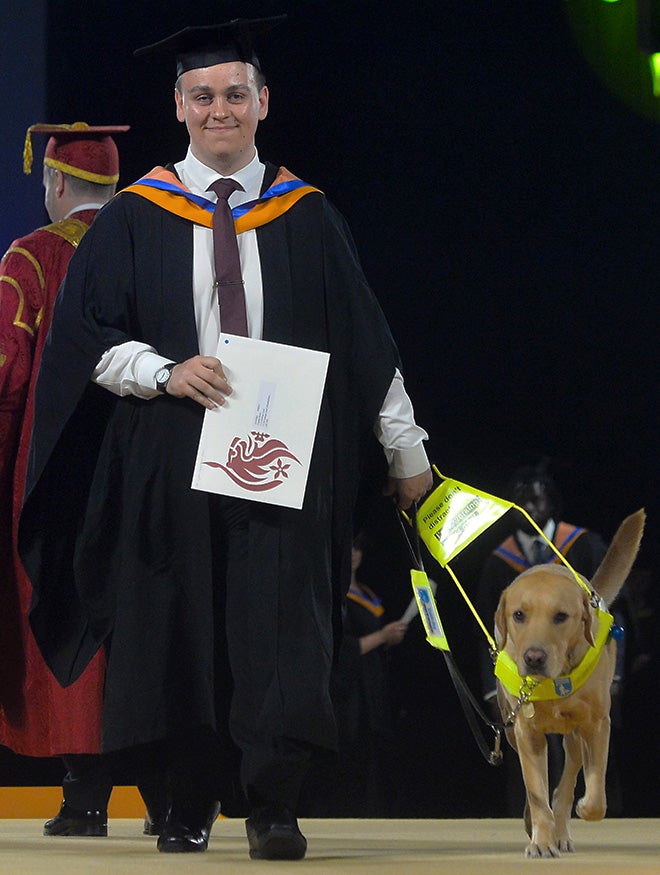
Job interviews, awkward comments and discriminatory attitudes
I'd been lucky enough to be selected for a creative data academy and a summer school whilst at university, and that gave me lots of networking opportunities. I was applying for roles, but never managed to secure one. My friends were finding work, but I wasn't. I was always coming close but not getting an offer.
I graduated with a first class honours degree and continued looking for work. I had fifteen interviews, and they were all over the place. Some were charities, but many were in the private sector.
I was thinking, again, about committing to relocating completely for some of these jobs. That would have been uprooting myself again. I would have done it, but it would have been another big thing.
Some of the interviews were very interesting. One of which, I turned up and I had my guide dog Carlo with me. I was well presented, wearing my suit, and one of the interviewers said, "Oh, you know, the conference room where the interview's being held is upstairs. I'll have to find one downstairs."
They were panicking. I said "It's fine. I can climb stairs. There's nothing wrong with my legs, it's my eyes that don't work so well."
They said, "Okay, slowly up the stairs now" and were walking in front of me at half-pace with their hand out in case I fell over. These sorts of things, I wanted to cringe at so much. I felt that it was a lack of understanding.
At a lot of my interviews, I felt compelled to reassure the interviewer that my visual impairment would never restrict me in my work. I wanted to address the elephant in the room straight away.
I know under equality laws they're not allowed to address these things at the interview stage. But if I didn't bring it up, many would bring it up. I know they're not meant to, but they did.
They wouldn't directly do it, it would be like, "well, in this scenario there are extra complications, and how would you overcome them?" And I thought. "Oh, because I'm blind? Oh, okay, right". I just answered them and didn't let it faze me.
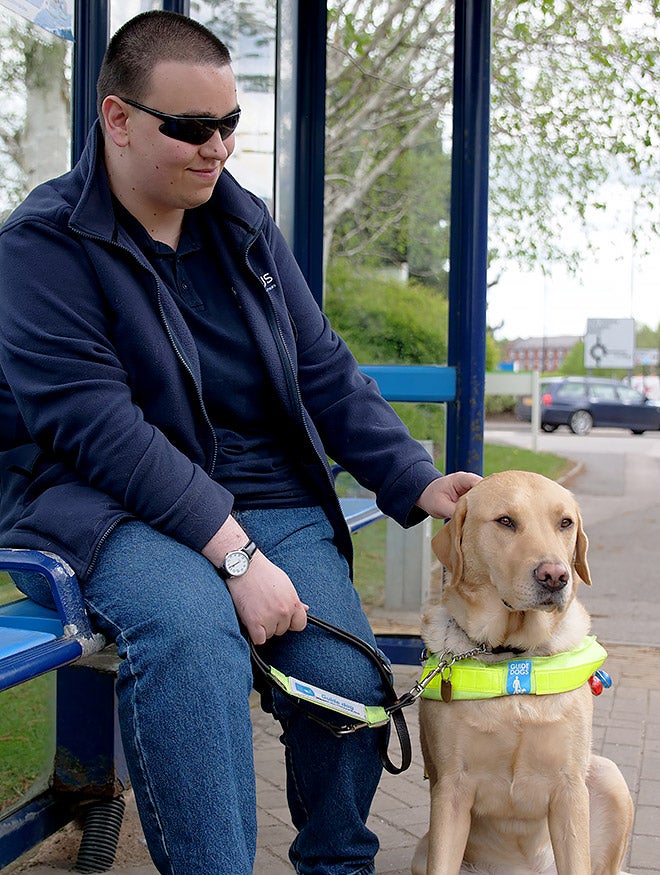
Guide dog refusal and being judged at job interviews
I even had a guide dog refusal at one of my interviews. They wouldn't let me in with Carlo. Literally they said “we don't have dogs in here.” I replied, “It's a guide dog,” and tried to explain. They said, “Yes, but someone’s allergic, so we don't have dogs.”
Sometimes I wouldn’t take Carlo, and just used my white cane. I don't think a lot of people know what a white cane is, so when they spotted it they’d say things like, “Oh. You're blind? Oh, okay. Ooh.”
People would say, “you look fully able”, and I tend to say, “well, what does a blind person look like, then? I'd love to know.”
Choosing not to bring my guide dog into interviews was a deliberate decision to see if it affected my success rate in interviews. It was one of these things that I thought about, because I'm a very reflective person.
Without Carlo, I thought I’d maybe get onto a level playing field first. And then in a conversation I felt comfortable with, I'd disclose it. But walking in with a guide dog, it was, like, 'right, I'm blind. Where shall we start?'
I thought maybe that was putting people off from the word go. It's very sad to have to think like that, but I wanted them to see my personality before the fact that I was blind. To go, 'Oh, yes, I really like him. I'll get on with him, so I want him in my team. Right, and oh, he's blind.'
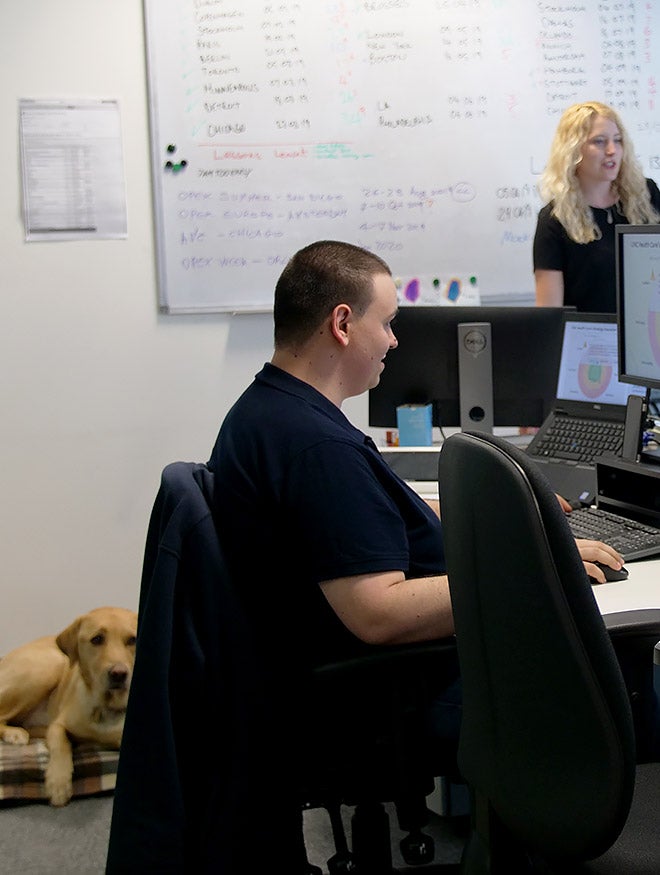
Finding out about Scope’s Support to Work service
I first heard about Scope’s Support To Work service when I saw an advertisement on Facebook.
I’d had fifteen interviews, but to count the amount of actual job applications I filled in and sent off, and the rejection emails I'd got, I've lost count! It could be in the hundreds, if not thousands!
It just felt like every night I sat up thinking, 'Oh, I sent another two or three off last night' and 'Oh, I did another one'.
So, I was really interested when I saw an advertisement from Scope about finding work, because it’s a charity I knew would understand where I was coming from with a lot of these things.
A lot of people I’d spoken to in the past weren't really understanding of how it felt to be knocked back, and of the barriers I was facing with being disabled. So, I wanted that support in another way.
I knew that someone who'd give me pointers and maybe tips or tricks on how to approach applying for a job could be really useful. I read up on how Scope’s Support To Work service could help with things like CVs and writing for applications. I thought, “maybe that's what I'm doing wrong somewhere.” So, I applied for Scope’s Support To Work service.
It was very quick. Within a day or two after applying, someone contacted me, to tell me they're finishing off the Support To Work application and then introduced me to my employment advisor, Zaid.
I think it was once a week we were scheduling in a phone call. From the word go, I sent Zaid everything I had - my CV, cover letters I’d been using and adapting when I applied for a job, a rough guide on what jobs I was trying to go for, just to see what he thought.
Zaid was really thorough. He came back to me straight away. He was saying, you know, “your CV's really good, but I’d tweak this, this and this.”
I think there's not a consistent knowledge of what should and shouldn't be in a CV and how it should be designed. But Zaid would come back to me and say, “this and this needs to be changed.” At that point I was willing to try anything to see if it worked. I did, and it definitely helped me.
Every so often, Zaid would give me more job adverts to apply for. Some of which were, in my opinion, jobs that had higher salary and more senior than I’d considered. I thought “I'll never get that.” I would say to Zaid, “You're thinking I'm a lot better than I think I am”, but he had the attitude of, “apply for anything and you never know what may come back.”
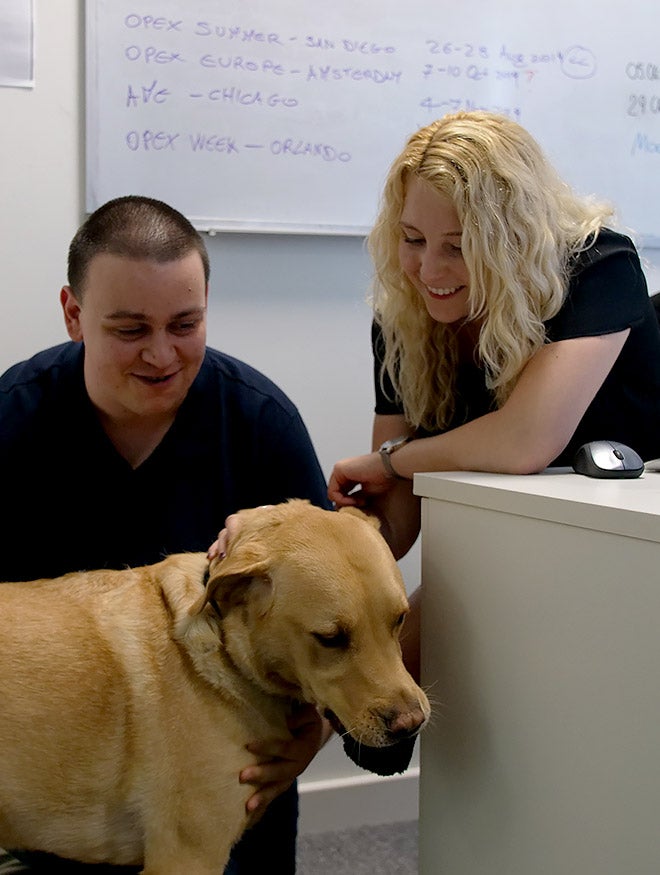
Interviews and talking about disability
At the start, we did talk about my disability. But the more Zaid learned about me, the less I felt we needed to discuss it. He knew what I could and couldn't see, and what I could and couldn't do.
I think that forming that professional relationship with Zaid was what really helped me, and helped him advise me on how I could do things, and the best way forward.
In interviews I would say that because of my visual impairment, I do have barriers, but that I've learned many techniques and ways of doing things over the years to overcome those barriers.
Because of that I'm actually a better person. Any barriers I do come across, I work hard to overcome them, to the extent that you wouldn't even notice I've actually got a disability.
I always told Zaid that’s how I would approach that sort of question. He’d say that's a really good example of how to answer a question that was aimed at my disability, and to focus on how I overcome things.
If someone asked me, “How do you overcome problems?” then I could use that opportunity to address the elephant in the room and say that because I’m visually impaired, I've learned lots of techniques to overcome barriers, and that's why I would be better in this role.
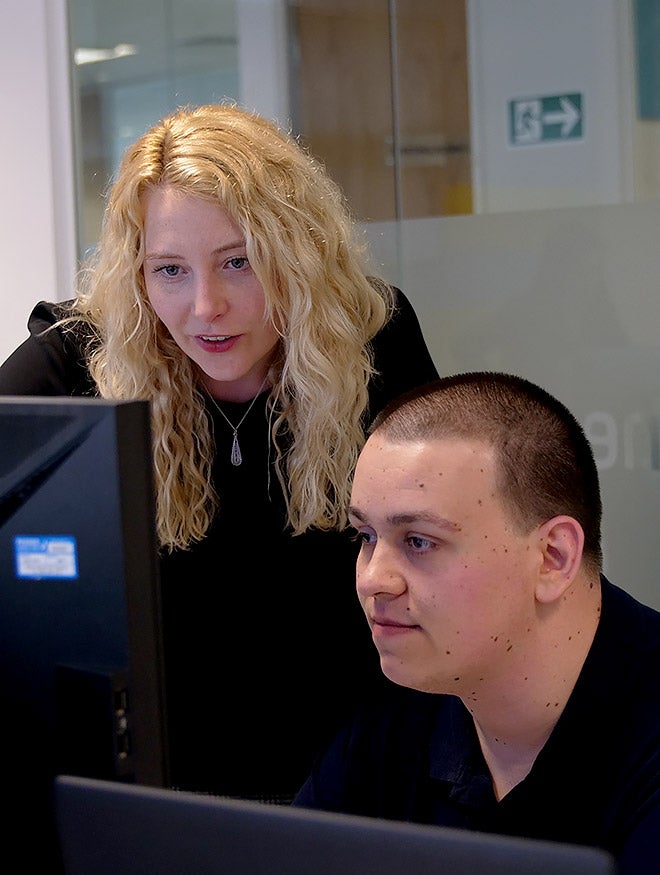
Successfully interviewing for a job
I actually had a call scheduled with Zaid the day before an interview I got with a software company called i-Nexus. For several reasons, we had to cancel that call at the last minute, but spoke via email, and Zaid gave me last minute advice.
I remember on the day of my interview for Digital Marketing and Campaign Executive at i-Nexus, my would-be boss was not at all fazed with the fact I walked in with my guide dog, Carlo.
Carlo is very excitable and playful, and will not be very well behaved if he's given attention. Even when he's working, which is naughty of him, but that's the Labrador and the puppy still inside him, which hasn't gone away with growing up, sadly. But they only focused on me and not Carlo.
In past interviews, I’d always been nervous about Carlo, because I knew he would maybe play up a bit, and if the attention's not on him, he’ll do a bit of a vocal cry and whimper. It's, like, “shut up now. I'm in the middle of an interview!”
But in this interview, Carlo just laid on the floor fell asleep straight away. It was perfect. Then I could relax. I continued with the interview, and my interviewer, she was absolutely lovely.
I was a bit more blunt in this interview. I said, “I've had lots of people turn me down, and I think slightly because I'm disabled, slightly because I'm fresh out of uni and haven't got a wealth of experience, but I'm eager to learn. I've got this, this and this attribute, and I'm really looking for that one person that has the confidence to take that chance on me and see me flourish because of it.”
I think that's what she loved about me. She said I came across as someone who is determined and inspirational, and that's the sort of person she really wanted in her team to keep everyone motivated and happy. Obviously, having a dog in the office would be a massive tick too!
She brushed over the details of having a dog in the office and what that would mean, and we discussed how we could overcome any potential challenges with it.
It was just completely open and honest from the word go, and that's what really helped us at that stage.
After the interview I was delighted to receive a call saying I’d been successful in getting the job.
I'm now three months into the role, and we've had absolutely no problems. My boss says, “I forget. Except for the dog being a very big reminder”. But she's, like, “I forget you're blind”. I think because I work as hard and can do things just as quick and as easily as anyone else, my boss sees that I’ve never let my disability stop me from doing anything.
My job as Digital Marketing and Campaign Executive means I’m essentially the go-to person for different managers in my team, from the campaigns manager and digital manager to the events and brand managers. We do a lot of events in Europe and the US. We do a lot of social media and explore different ways to contact potential leads to attend these events. Helping with the rebranding of their website has been an exciting project and there's always something new, which I love. My boss has never been scared to give me something new.
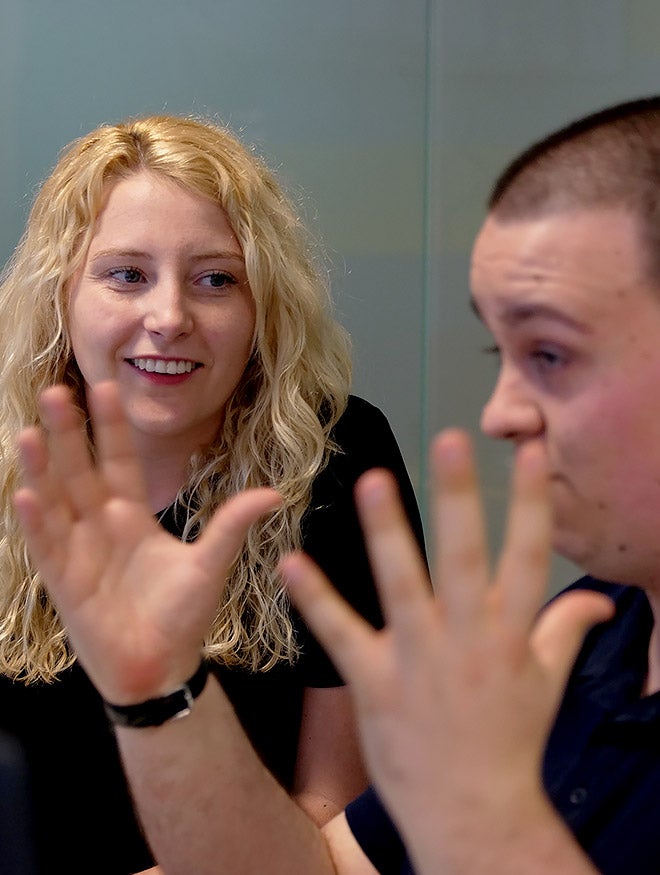
The positive benefits of employing disabled people
In a nutshell, having disabled people in the workplace is paramount for the organisation, because it helps them become better people, at the end of the day.
My workplace had never worked with a blind person or guide dog in the office, and because of that, they now think they'd be more confident with approaching someone with a similar disability, or any sort of disability, really.
My employers are just more confident now with helping someone overcome a problem, or even just giving them the time of day - which I know some people are just too scared to do.
I'd like to hope every disabled person would be given the time of day to talk about their disability. I'm quite open and honest about mine. I know some people are a bit more private, which is completely understandable. I might be, if it was a more sensitive topic.
But I also think more open conversation makes everyone a lot happier in the workplace. And also, with having a guide dog in the office, everyone just comes to me and says, “can I have a Carlo five minutes, please?” They just will sit on his dog bed and play with him and his toys. He gets loads of fuss. It gives Carlo mental stimulation in between his naps too, and it helps everyone, really.
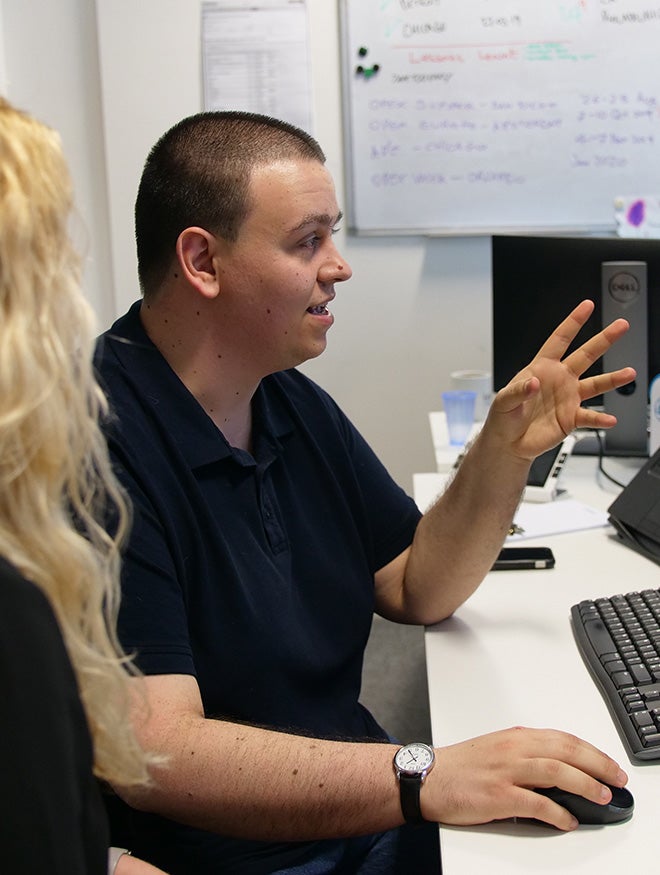
Employing a disabled person can be seen as a gamble
I think it’s seen as a bit of a gamble to take on a disabled person. A bit of a risk. But, if employers get to see the actual person for themselves, like my boss did, then that changes things.
I think the biggest barrier in interviews is that awkwardness at the very beginning. It could completely ruin a conversation, or make it. But I think you can take an awkward fact and make it into a good conversation-starter. Having that open and honest conversation does wonders.
I think Scope and Virgin Media's Work With Me campaign is a great way employers can take steps to creating a more inclusive workplace.
 19 June 2019
19 June 2019


